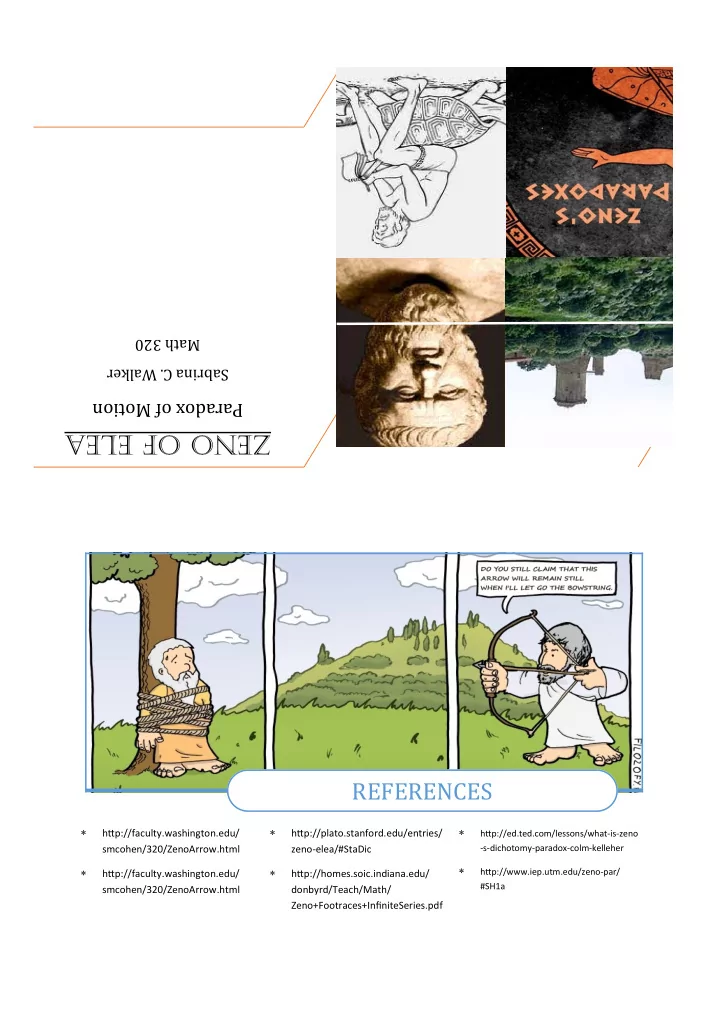

Math 320 Sabrina C. Walker Paradox of Motion Zeno of Elea REFERENCES htup://faculty.washington.edu/ htup://plato.stanford.edu/entries/ htup://ed.ted.com/lessons/what - is - zeno - s - dichotomy - paradox - colm - kelleher smcohen/320/ZenoArrow.html zeno - elea/#StaDic htup://www.iep.utm.edu/zeno - par/ htup://faculty.washington.edu/ htup://homes.soic.indiana.edu/ #SH1a smcohen/320/ZenoArrow.html donbyrd/Teach/Math/ Zeno+Footraces+InfjniteSeries.pdf
Biography 490 — 430 B.C.E.; Elea in Magna Graecia, Member of the Eleatjc School founded by Parmeni- des Most of what we know about Zeno and his works comes from Plato ’ s Parmenides and Aristotle ’ s Physics. Before Zeno, Greek thinkers favored presentjng their philosophical views through poetry. Zeno began the shifu away from poetry toward a prose that contained explicit premises and conclusions. Apparently, Zeno planned to overthrow Nearchus the tyrant, but was arrested and tortured. His tor- turers wanted his to reveal the other conspirators; Zeno refused and said he had a secret for Near- chus. When Nearchus leaned in to hear it, Zeno bit his ear and held on tjll his death. The Stadium “ Fourth is the one about the things in the stadium mov- ing from opposite directjons, being of equal bulk, along- side things of equal size, with some moving from the end of the stadium and some from the middle, at equal speed, in which case he supposes it turns out that half the tjme is equal to its double ” Zeno mistakenly supposes that a moving body pass- es both moving and statjonary objects with equal speed. Aristotle argues that how long it takes to pass a body depends on the speed of the body; for exam- ple, if the body is coming towards you, then you can pass it in less tjme than if it is statjonary.
The Arrow “ If everything when it occupies an equal space is at rest, and if that which is in locomotjon is always occupying such a space at any moment, the fmying arrow is therefore motjonless. ” 1. When the arrow is in a place just its own size, it ’ s at rest. 2. At every moment of its fmight, the arrow is in a place just its own size. 3. Therefore, at every moment of its fmight, the arrow is at rest. The argument falsely assumes that tjme is composed of “ nows ” (indivisible instants). There is no such thing as motjon (or rest) “ in the now ” (at an instant). Weakness in Aristotle ’ s solutjon: it seems to deny the possibility of motjon or rest “ at an instant. ” But instantaneous velocity is a useful and important concept in physics. Parmenides and the Beginning of Paradoxes Founded the Eleatjc School of Philosophy His only surviving work is a poem called “ On Nature ” . “ Parmenides rejected pluralism and the reality of any kind of change: for him all was one indivisible, unchanging reality, and any appearances to the contrary were illusions, to be dispelled by reason and revelatjon. “ Paradox—a statement or propositjon that, despite sound (or apparently sound) reasoning from acceptable premises, leads to a conclusion that seems senseless, logically unacceptable, or self - contradictory. It is believed that he is the reason behind Zeno ’ s paradoxes. According to Plato, Zeno sought to defend his mentor by atuacking his critjcs (ad hominem ).
Dichotomy Paradox “ The Paradox of Cuttjng in Two ” “ The fjrst asserts the non - existence of motjon on the ground that that which is in locomotjon must arrive at the half - way stage before it arrives at the goal. ” Gettjng to the basics, an object cannot cover a fjnite distance by moving during an infjnite se- quence of tjme intervals. Space is assumed to be divisible and tjme indi- visible. The Achilles “ In a race, the quickest runner can never overtake the slowest, since the pursuer must fjrst reach the point whence the pursued started, so that the slower must always hold a lead. ” Zeno ’ s fmaw in this argument was his unstated assumptjon that the sum of an infjnite series (or at least an infjnite series like this, where every term is greater than zero) cannot be fjnite.
Recommend
More recommend